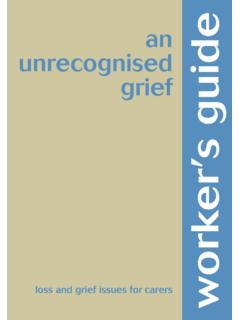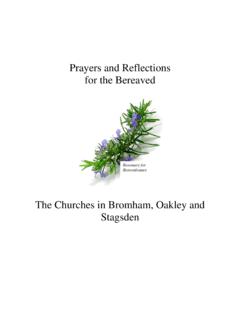Transcription of Is Suicide Bereavement Different? A Reassessment of the ...
1 Suicide and Life-Threatening Behavior 31(1) Spring 200191 2001 The American Association of SuicidologyIs Suicide Bereavement Different? AReassessment of the LiteratureJOHNR. JORDAN,PHDThe question of whether Suicide Bereavement is different from mourningafter other types of deaths has important theoretical and clinical recent literature reviews have argued that the differences may be contrast, this article suggests that Suicide Bereavement is distinct in three signif-icant ways: the thematic content of the grief, the social processes surrounding thesurvivor, and the impact Suicide has on family systems.
2 In addition, problems inthe methodology used to compare different Bereavement experiences are ad-dressed. Some clinical implications of these conclusions, including the need forhomogeneous support groups, psychoeducational services, and family and socialnetwork interventions are also would seem obvious that surviving the ample, van der Wal (1989 1990) concludedthat there is no empirical evidence for thedeath of a loved one from Suicide is a difficultexperience, one that has the potential to pro- popular notion that survivors of Suicide showmore pathological reactions and a more com-duce a markedly different type of mourningprocess from other types of losses.
3 Certainly, plicated and prolonged grief process thanother survivor groups (p. 167). More re-mourning after the Suicide of a loved one isoften perceived by the survivor to be a very cently, Cleiren and Diekstra (1995) have sug-gested that it is unlikely that the symptom- different experience from the losses of othermourners (Alexander, 1991; Bolton, 1983; atology of problematic adaptation in suicidebereavement differs from that of other typesWertheimer, 1991). A consensus of cliniciansand researchers also indicate that the mourn- of Bereavement (p. 31). They note that thesymptom patterns common in Suicide be-ing process after Suicide is different and moredifficult than mourning after other types of reavement are also found in other types oftraumatic loss, even in some losses due to ill-deaths (Clark & Goldney, 1995; Hauser,1987; Knieper, 1999; Rando, 1993; Range, ness.)
4 McIntosh (1993) also reached similarconclusions in his literature review of the1998; Sprang & McNeil, 1995; Worden,1991). Yet several researchers who have re- more methodologically rigorous investiga-tions where Suicide survivors are comparedcently reviewed the literature argue thatthere may be few, if any, empirically docu- to survivors of other types of death. He sug-gested four generalizations about survivors:mented differences between Suicide bereave-ment and other types of mourning. For ex- (a) There appear to be more similarities thandifferences between Suicide and other typesof survivors (particularly sudden-death survi-JOHNR.
5 JORDAN,PHD, is the Director,vors); (b) there may be a small number ofSuicide Grief Support Program, The Traumagrief reactions that are different for survivors,Center, Allston, these are not yet clearly established; (c)Address correspondence to John R. Jordanthe course of Suicide Bereavement may differat The Trauma Center, 14 Fordham Road, All-ston, MA 02134; E-mail: time; (d) but after the 2nd year, the re-92 ISSUICIDEBEREAVEMENTDIFFERENT?actions observed in Suicide Bereavement der Wal (1989 1990) are correct in notingthat the evidence for quantitative differencesseem to show few differences from themourning trajectory for other types of losses.
6 Between Suicide and other types of bereave-ment is mixed, there is also considerable evi-What are we to conclude from the ap-parent contradiction between the perceptions dence that the qualitative or thematic aspectsof the grief may be different after a suicideof people who are bereaved by Suicide andthe clinicians who work closely with them, (Clark & Goldney, 1995; Cleiren, 1993;Dunn & Morrish-Vidners, 1987 1988; Nessand researchers who study survivors from agreater distance with the tools of social sci- & Pfeffer, 1990; Range, 1998; van der Wal,1989 1990). These special themes of suicideence?
7 The question has important theoreticaland practical implications for caregivers who Bereavement manifest themselves in threebroad areas of grief response. First, numer-wish to help Suicide survivors. For example,the Suicide of a loved one is commonly de- ous studies have found that survivors seemto struggle more with questions of meaningscribed as a risk factor for the developmentof complicated mourning (Rando, 1993), and making around the death ( Why did they doit? ) (Grad & Zavasnik, 1996; Silverman,special clinical services are frequently recom-mended for survivors (Knieper, 1999). Yet if Range, & Overholser, 1994 1995; Smith,Range, & Ulmer, 1991 1992; van der Wal,grief after Suicide is not different from othertypes of Bereavement , then there may be lit- 1989 1990).
8 Because Suicide is self-inflictedand violates the fundamental norms of self-tle rationale for partitioning out survivors foradditional monitoring or specialized inter- preservation, survivors often struggle tomake sense of the motives and frame of mindventions. On the other hand, if we can iden-tify what is different about Suicide from other of the deceased. Second, survivors showhigher levels of feelings of guilt, blame, andlosses, yet common to most or all Suicide be-reavement, we should be able to plan more responsibility for the death than othermourners ( Why didn t I prevent it?)
9 Targeted and effective interventions for thispopulation. This article is written in response (Cleiren, 1993; Demi, 1984; Kovarsky, 1989;McNiel, Hatcher, & Reubin, 1988; Miles &to the recent reviews that argue that suicidebereavement is not fundamentally different Demi, 1991 1992; Reed & Greenwald, 1991;Silverman et al., 1994 1995). Occasionally,from other types of mourning. While ac-knowledging that it shares many elements survivors feel that they directly caused thedeath through mistreatment or abandonmentcommon to other forms of loss, this articleargues that Bereavement after Suicide is suffi- of the deceased.
10 More frequently, they blamethemselves for not anticipating and prevent-ciently distinct to merit additional researchand specialized clinical services for most sui- ing the actual act of Suicide (Cleiren & Diek-stra, 1995). Third, several studies indicatecide survivors. The goals are to summarizethe empirical support for the themes that set that survivors experience heightened feelingsof rejection or abandonment by the lovedsuicide Bereavement apart from other formsof grief, the distinct aspects of social pro- one, along with anger toward the deceased( How could they do this to me? ) (Barrett &cesses after a Suicide , and the differential im-pact of Suicide on family systems.)







